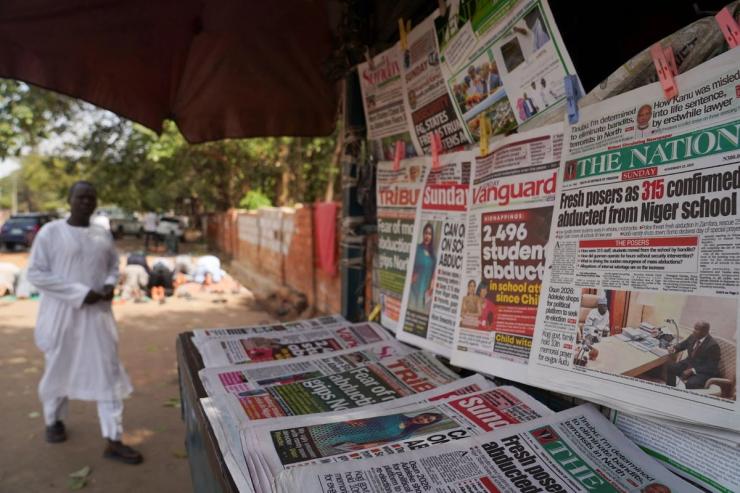The News
Nigeria is scrambling to tackle a resurgent security crisis involving the mass abduction of schoolchildren as claims of Christian persecution have become the focus of US bilateral relations with Africa’s largest democracy.
Gunmen abducted hundreds of students from two schools 300 miles apart within three days last week, including more than 300 students from a Catholic school and at least 25 from an all-girls school. Kidnappings for ransom by armed gangs have become common in much of northern Nigeria in recent years. Nigeria’s education ministry temporarily closed nearly half of all federal government-owned high schools to prevent further attacks. Katsina, a northern state where gunmen kidnapped more than 300 students five years ago, also suspended classes at its schools.
The new wave of kidnappings comes amid Washington’s proposed use of sanctions and military threats to force a response to claims that Christians are the target of violent attacks — a view circulated for years in Washington within fringe conservative circles that largely fell on deaf ears but has gained credence in the Trump administration and could lead to punitive measures against Abuja.
The mass abduction at the Catholic school took place a day after a hearing on Nigeria by the US House of Representatives committee on foreign affairs. Jonathan Pratt, the State Department’s senior official for African affairs, said the administration was considering actions that would “incentivize and compel the Nigerian government to better protect Christian communities and improve religious freedom.” The plans could include sanctions “as well as possible Department of War engagement on counter-terrrorism and other efforts to protect religious communities,” Pratt said.
“I think Nigeria’s a disgrace,” US President Donald Trump, who redesignated Nigeria a “country of particular concern” in October after first doing so in 2020, told Fox News on Friday. “It’s a genocide and I’m really angry about it.” Nigerian officials have repeatedly rejected Trump’s claim of genocide.
Nigeria’s President Bola Tinubu, after an emergency meeting with security chiefs on Sunday evening, said the government will recruit 30,000 new officers to tackle gangs that carry out mass kidnappings.
In this article:
Know More
Nigeria — a nation of 220 million people — is roughly evenly split between a predominantly Muslim north and mainly Christian south. Attacks by criminal gangs and Islamist insurgents have gripped northern states over the last decade where most victims are Muslims.
Claims of Christian victimization have been spread by lobbyists in Washington over much of the last decade but were dismissed by Trump’s predecessors. Trump, in his first term, added Nigeria to a list of countries accused of engaging in or tolerating religious persecution, only for Joe Biden’s administration to remove it from the list.
Tinubu’s two-year presidency has focused on fixing Nigeria’s ailing economy by cutting fuel subsidies, engineering a return to orthodox monetary policy at the central bank, taming inflation, and introducing a new tax regime. But insecurity — especially armed conflict around the Lake Chad Basin area by groups like Boko Haram and the Islamic State of West Africa (ISWAP) — remains a major headache.
Step Back
Nigeria is in fifth place on an index of the most dangerous and violent countries in the world, according to the conflict monitoring group ACLED, only behind Palestine, Myanmar, Syria, and Mexico. More than 20,000 civilians have died in the country since 2020 due to conflict, the group estimated. The scale of violence has attracted the attention of the US president as well as accusations of Nigerian government complicity in allowing attacks against Christians.
The recent abductions revive a long-running scourge that Nigeria has battled since the terrorist group Boko Haram kidnapped 276 school girls from Chibok in 2014, with nearly a third still missing. Now as then, insecurity at Nigerian schools in the north is occurring in the context of a broad rash of violence across the country, from farmer-herder conflicts in the east and central regions, armed banditry attacks in the northwest, and youth restiveness in the south.
Analysts fear that last week’s abductions and the response through school closures underscore serious inadequacies in the strength of the Nigerian state and its anti-terrorism ambition and approach. Nigeria is now “in the advanced stages of a fundamental crisis of state legitimacy,” Cheta Nwanze of the Lagos-based geopolitics consultancy SBM Intelligence said, blaming politicians who have viewed “governance as a secondary concern to personal enrichment” over the past decades.
The View From Abuja
“If shutting down schools is the only option to prevent school abductions, then we must admit that we are already losing the battle to terrorists,” said Ahmad Salkida, a veteran conflict mediator and founder of Abuja-based conflict tracking media outlet HumAngle, who believes Nigeria’s insecurity has “worsened” under Tinubu.
That sense of Nigeria losing the battle was starkly in view before last week’s school children abductions. Days earlier, an army brigadier general and four other soldiers were ambushed, abducted, and executed by ISWAP in northern Borno state. The general was the highest-ranking Nigerian army official to ever be captured and killed by terrorists in the country.
Notable
- Nigeria’s instability stems from the post-independence failure to “establish a national identity grounded in basic freedoms and dignity,” not just religion and language, Oge Onubogu, director of the Africa Program at the Center for Strategic and International Studies think tank in Washington, told the US House foreign affairs committee last week.


